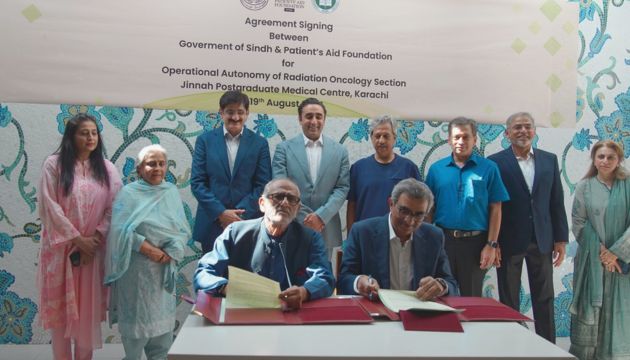KARACHI: Pakistan People’s Party (PPP) Chairman Bilawal Bhutto Zardari inaugurated multiple state-of-the-art medical facilities at the Jinnah Postgraduate Medical Centre (JPMC) in Karachi.
These include the 120-bed Rashid Soorty Department of Psychiatry and Behavioral Sciences, the 110-bed Saif-ul-Islam Department of Neurology and Stroke Unit, and a cutting-edge CyberKnife S7-FIM system, highlighting the province’s commitment to providing free and high-quality healthcare.
Speaking at the inauguration ceremony, he praised Sindh’s healthcare institutions, emphasizing that the best hospitals in Pakistan, including JPMC, the National Institute of Cardiovascular Diseases (NICVD), and the National Institute of Child Health (NICH), are located in Sindh.
Bilawal described these institutions as symbols of good governance and successful public-private partnerships, particularly after the 18th Constitutional Amendment.
“You often hear criticism of the Sindh government’s efforts, but actions speak louder than words,” he said, highlighting that the NICVD is the world’s largest heart hospital offering free treatment, while the NICH provides free pediatric care.
The PPP chairman said the CyberKnife machine at JPMC provides free cancer treatment that would cost thousands of dollars abroad.
The Royal College of Radiology ranks the JPMC Cancer Treatment Department among the top 10 globally, a testament to the province’s healthcare advancements.
He acknowledged the contributions of Sindh’s business community in partnering with the government to provide these free services. He contrasted Sindh’s focus on strengthening public healthcare with other provinces that prioritize private hospitals through health cards.
He said the expensive PET-CT scan for cancer diagnosis was available for free only in Sindh. Patients from 167 cities across Pakistan and 15 other countries benefit from JPMC services.
He suggested to Sindh Chief Minister Murad Ali Shah that during the prime minister’s next visit to Karachi, he should be taken on a tour to JPMC, NICVD, and NICH and expressed his willingness to help establish similar hospitals in other provinces, particularly Punjab and Balochistan.
In addition, Bilawal participated in a signing ceremony between the Patients’ Aid Foundation and the Sindh government for the Radiation Oncology Section at the JPMC, attended by prominent figures including Murad Ali Shah, Health Minister Dr Azra Fazal Pechuho and others.
Murad announced that on the instructions of Bilawal, the provincial government provided a new state-of-the-art CyberKnife system worth $4.1 million to the JPMC. The Sindh government has been covering the operational costs of the CyberKnife unit since 2018, in collaboration with the Patients’ Aid Foundation. The new CyberKnife unit, featuring advanced technology, allows procedures to be completed in just 20 minutes, significantly reducing treatment times compared to older systems. This makes the JPMC one of the world’s top 10 centres for cancer treatment with radiation, housing two CyberKnives and two Tomotherapy units under one roof.
He emphasized that the JPMC was the only centre globally offering free CyberKnife and Tomotherapy treatments, regardless of the patient’s nationality, religion or ethnicity. He noted that 15 countries and 167 cities in Pakistan benefited from these free services.
He said the Sindh government has granted operational autonomy to the Patients’ Aid Foundation for the Radiation Oncology Section, fostering growth and introduction of new technologies.
He pointed out that rather than investing in private healthcare through insurance, the government is focusing on strengthening public hospitals to provide free treatment to all including cancer patients.
Azra Fazal Pechuho informed that in 2020, the Patients’ Aid Foundation introduced the Tomotherapy technology in Pakistan, treating around 50 patients daily, with a second unit currently being installed.
The new Psychiatry and Neurology Departments, inaugurated by Bilawal, represent a significant upgrade from the previous facilities.
The Rashid Soorty Department of Psychiatry and Behavioral Sciences now has 120 inpatient beds and modern OPD facilities, while the Saif-ul-Islam Department of Neurology and Stroke Unit offers 110 beds and specialized treatment options, addressing the increasing demand for mental health and neurological care.














